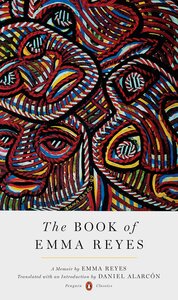Take a photo of a barcode or cover
Un libro bello y maravilloso. No puedo dejar de pensar en Emma Reyes, en lo que fue de su vida despues de escaparse del convento, y en lo mucho que me hubiera gustado sentarme para conversar con ella en vida.
Emma'nin 19 yaşına kadar olan hayatını kendi kaleminden mektuplar halinde dinlediğim bu biyografiye bayıdım. Bu kadar zor bir hayat ancak bu kadar ajite etmeden anlatılabilirdi. Hayatının geri kalan kısmını ve ürettiği sanatını da ilerleyen günlerde araştırmayı düşünüyorum. Emma'nın hayatına dair merakım hala capcanlı. Sizlere de gönül rahatlığıyla okumanızı öneririm
"Abrazos a la familia," cierra cada carta mientras Una se queda sin aliento.
adventurous
dark
emotional
funny
lighthearted
reflective
fast-paced
Nunca había leído una historia tan dolorosa que me provocara un sentimiento contrario. Cada carta está escrita de una manera tan hermosa y pulcra en detalles, que no hay revolcón atascado a la tristeza sólo hechos narrados a la distancia desde el recuerdo de aquella niña que los vivió. Es admirable la manera en la que quedaron registrados en esa correspondencia y la carga que contienen, pero de nuevo, no es un libro que use al dolor como el prexto para hacer espectáculo, todo lo contrario, es casi como un soltar sabiendo que ya es momento de dejar ir lo malo y sentirse mejor sin ese peso. No hay rencor, ni enojo en quien cuenta y por su manera de compartir esos momentos, a una le resulta complicado experimentarlos también. Eso sí, la historia de Tarrarura me pinches partió.
En realidad no lo pude terminar. Luego de un languideciente 27% de podredumbre humana escrita con maestría, me pareció que estoy más cómodo con lo segundo que con lo primero. A ver si me da el animo, en el futuro, para retomar una historia tan trágica con el talento de una ágil narración. Not today.
I downloaded this book because Susan Straight said it was the best book she read last year. It's an extraordinary artifact from a woman who survived a traumatically ordinary childhood and became a successful artist in Europe. Born into poverty in Colombia in the first half of the 20th century, Emma and her sister Helena are abandoned by their abusive mother and smart enough not to help the nuns who rescue them to track down their family. The nuns are abusive too, but in a more mundane, institutional way. Emma has an artist's eye for detail that threads itself through the book like the delicate embroidered tablecloths she slaves over at the convent. In a world of drudgery and ritual, she finds magic--as when she befriends a strange girl who claims a tiny ceramic doll named Tarrarurra is in fact her little brother, who journeys into the world and brings back stories in exchange for bits of stolen food. "I preferred the stories of Tarrarurra to the stories of Sacred History," Emma confesses. It shows; her own story is told simply (via a series of letters to a friend), viscerally, wryly, and unblinkingly.
Después de leer este libro entendí por qué es tan popular, no esperaba mucho, pero me sorprendió muchísimo, me encantó leerlo, está narrado de manera sencilla pero no por eso la historia es menos compleja. Sin duda soy una admiradora de las prácticas epistolares, son tan intensas y cercanas.
Antes de leer este libro había visto la reseña que alguien había hecho acá, decía algo así como que le había gustado tanto esta historia que no quería saber si era real o no, y pienso lo mismo.
Antes de leer este libro había visto la reseña que alguien había hecho acá, decía algo así como que le había gustado tanto esta historia que no quería saber si era real o no, y pienso lo mismo.
I read this book after scrolling through my library offerings. I loved the vivid details in the story and the way that she was able to really transport me into a different time. Being an autobiography I read it with a tinge of sadness and disbelief that anyone had to encounter such a challenging upbringing.



